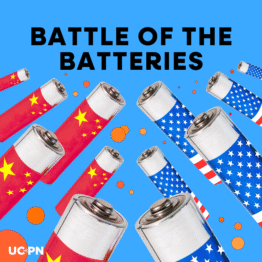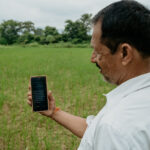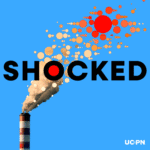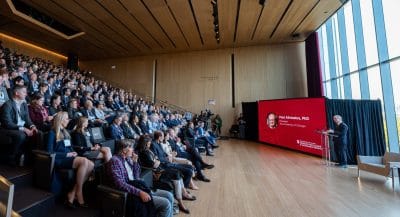Ten graduate students spent their summer immersed in research and mentorship as part of the James Bartlett Fellowship Program in Energy and Environmental Policy and the DRW Graduate Fellowship in Economics and Policy. The students worked alongside leading faculty in law, public policy, chemistry, and geophysical sciences, gaining first-hand experience conducting climate and energy research projects. During the full-time, ten-week program, the fellows built new working relationships and valuable technical skills.
Read about the fellows’ experiences in their own words below.
DRW Fellow; Mentor: Erin Kelley, Assistant Professor, Harris School of Public Policy
Júlia Mansur is an incoming second year MA in Public Policy with Certificate in Research Methods (MACRM) candidate at the Harris School of Public Policy. As a DRW Fellow, she worked with Professor Erin Kelley on her microfinancing project for refugees in Uganda.
“In the future, I plan to build a career in applied policy research in Brazil, where I am from. Working with Erin has prepared me to interact with stakeholders to design policies, as well as to produce research instruments, such as surveys, which are crucial for evaluating the impact of an intervention.”
DRW Fellow; Mentor: Guangbin Dong, Professor, Chemistry
Kezhi Chen is a Ph.D. student in Chemistry, working in Professor Guangbin Dong’s laboratory. His research focuses on transition metal catalysis and the development of sustainable synthetic methods for monomer synthesis. Currently, he is exploring dehydrogenation-functionalization strategies to convert fatty acid derivatives and acetals derived from waste cooking oils into valuable monomers. His work aims to enhance the efficiency and selectivity of catalytic transformations relevant to sustainable chemistry.
“This internship helped me see how fundamental research in catalysis and sustainable chemistry can inform public policy—especially in areas like climate change and renewable materials. It also reminded me of the importance of bridging lab work with broader impact to the society.”
Bartlett Fellow; Mentor: Shaoda Wang, Assistant Professor, Harris School of Public Policy
Lukman is a Master of Public Policy student at the Harris School of Public Policy. As a Bartlett Fellow, he worked with Professor Shaoda Wang researching law, economics and education.
“I have gained a lot about institutional knowledge in the United States setting (judicial system and education) as well as technical skills, which can also be beneficial if I continue studying a topic that pertains to environmental policy.”
DRW Fellow; Mentor: Erin Kelley, Assistant Professor, Harris School of Public Policy
Sarah Hussain is a Master of Science in Computational Analysis and Public Policy (MSCAPP) student at the Harris School of Public Policy. She brings several years of experience studying labor markets in low-income countries. As a DRW fellow, Hussain collaborated with Erin Kelley, Fiona Burlig, and Gregory Lane on monsoon-onset research using satellite-based flood data.
“It was a fantastic opportunity to learn from leading climate scholars while sharpening my technical toolkit—working hands-on with remote sensing data, reproducible pipelines, and empirical analysis. The experience deepened both my climate intuition and my data/analysis skills.”
DRW Fellow; Mentor: Mingyi Wang, Assistant Professor, Geophysical Sciences
Duzitian Li is a rising second-year PhD student at the Department of Geophysical Sciences, specializing in atmospheric chemistry and aerosol microphysics. This summer, he worked with Professor Mingyi Wang on research exploring oxidation chemistry and new particle formation.
“I was a little confused when the program started off, because I have not done experiments before. I grew more and more intrigued by it when I successfully set up the reactor, sampled useful data after long time waiting, and visualized the results. The program really has sparked my interest in research.”
Bartlett Fellow; Mentor: Eyal Frank, Assistant Professor, Harris School of Public Policy
Riley Morrison, an M.S. in Computational Analysis and Public Policy (MSCAPP) student, worked with Harris Professor Eyal Frank to study the environmental and economic impacts of area-based conservation approaches.
“My programming skills absolutely grew as part of this internship… particularly my grasp of the terra and landscape metrics packages. [So have] my understanding of causal analysis and putting together quantitative academic research. I’m flirting with the idea of doing a PhD, and getting this experience has been really informative and helpful on what academics and researchers do every day.”
Barlett Fellow; Mentor: Hajin Kim, Assistant Professor, Law School
Anu Raj Rana is a Master of Public Policy candidate at the Harris School of Public Policy. This summer, she assisted Professor Hajin Kim in analyzing corporate sustainability reports with a focus on ESG-related disclosures. Raj Rana supported the training and validation of an NLP-based model that classified report sentences into disclosure categories, which involved manually testing predictions to assess accuracy and improve performance. She also conducted literature reviews on environmental law, strengthening my knowledge of disclosure-related regulations.
“This fellowship gave me the chance to apply my training in statistical inference and data analysis, while gaining first-hand experience with the rigour and iterative testing that underpin credible research.”
Barlett Fellow; Mentor: Kim Wolske, Research Associate Professor, Harris School of Public Policy
Feiyu Xiang is a first-year Master of Science in Computational Analysis and Public Policy student at the University of Chicago. As a Bartlett Fellow, he worked with Professor Kim Wolske on two complementary projects at the intersection of data and behavioral research. First, Xiang used web scraping to collect names and profiles of environmental scientists, building a structured dataset that can support analysis and collaboration in the field. Second, he developed a website that simulates the experience of shopping for heaters online. This platform allows researchers to test how consumers respond to different product features, energy-efficiency information, and price cues, shedding light on the factors that shape sustainable purchasing decisions.
“This internship helped shape my future career in public policy by showing me how technical tools can be leveraged to design and evaluate policy solutions. Through web scraping and dataset creation, I gained experience in gathering and managing information at scale, a skill essential for evidence-based policymaking… These experiences strengthened my ability to bridge data science, behavioral insights, and policy analysis—skills that are increasingly important for addressing complex challenges like climate change and sustainable energy use.”
DRW Fellow; Mentor: Chris Clapp, Assistant Instructional Professor, Harris School of Public Policy
Qilin Zhou is a Master’s student in Computational Analysis and Public Policy at the Harris School of Public Policy. This summer, she worked with Professor Chris Clapp to assess how the BP oil spill affected the housing market and how the recovery projects mitigated the economic loss.
“This experience was transformative, allowing me to extend my technical practice in programming and algorithmic data analysis into a broader framework for solving complex problems. I learned to pair quantitative rigor with big-picture thinking, moving from simply executing code to designing nuanced research questions and understanding their real-world implications.”
DRW Fellow; Mentor: Shaoda Wang, Assistant Professor, Harris School of Public Policy
Zhichun Zhu is currently pursuing a Master of Arts in Public Policy with a Certificate in Research Methods (MACRM) at the Harris School of Public Policy. During the summer, Zhu continued his research on lobbying in China, compiling and collecting data on standards, including both central and local standards. At the same time, he began a new project examining the role of accountants in China’s economic growth, for which the researchers analyzed and organized data on Chinese accountants since 1990.
“I significantly improved my web-scraping techniques, enabling me to automate data collection more efficiently and handle larger volumes of raw data. Together, these experiences have broadened both my technical and analytical capacities, preparing me for more independent and rigorous research.”

































